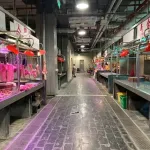By MDT,Yuki Lei
Copyright macaudailytimes

Despite recent employment challenges in Macau, the city’s traditional markets—most operators over 60—are poised for transformation. However, opportunities for young entrants remain limited, as noted by O Cheng Wong, president of the Macau Vendors Mutual Aid Association.
Macau’s employment landscape has faced challenges recently, yet young people demonstrate a strong entrepreneurial spirit. A prime example is the revitalization of Taipa Municipal Market, which has drawn young entrepreneurs eager to explore innovative business models. According to the Municipal Affairs Bureau (IAM), most of the 20 selected vendors for the light-meal, cultural-creative, and coffee-tea stalls at the under-renovation market—set to trial in Q4—are young entrepreneurs, who will operate 19 stalls focused on light meals and cultural-creative products.
Among them is Winnie, a post-90s mother who married into Macau while living in Hengqin. Facing the challenging job market, she decided to re-enter the workforce by setting up a stall at Taipa Municipal Market. Having previously run a dessert shop in Zhuhai, she now hopes to revive her old business in Macau. However, considering the fierce local market competition, she ultimately chose to operate a stall specializing in Chinese sweets and light snacks.
Winnie explained, “Caring for my son prevents me from working full-time, and part-time options are also limited.” With years of culinary experience, she opened her stall after dropping her son off at school, balancing family and business. “My goal is to secure a stable income—even if it only covers two meals daily,” she stated.
She noted that starting a business in the market is relatively low-cost, with stalls providing utilities and air conditioning. “This allows me to launch my venture with minimal investment,” she added. Despite numerous challenges, she remains convinced that, as she puts it, “Through hard work, one can find a livelihood in Macau’s wet markets.”
Winnie emphasized that this down-to-earth entrepreneurial spirit has deepened her appreciation for the value of every dollar earned, saying, “Each pataca I make reflects my effort and dedication.”
In a recent interview with the Times, O expressed optimism about the influx of young entrepreneurs into wet markets, believing their innovative ideas could revitalize traditional markets. He highlighted the Taipa Municipal Market in a tourist area that has attracted many young visitors in recent years, stating, “They [young business operators] may well invigorate the market.”
However, he acknowledged that over the past decade, Macau’s wet markets have welcomed only 15 new operators, with Patane Market being the sole survivor. It features a food court where five young entrepreneurs continue to run the business while all others have ceased operations.
It is noted that the average age of traditional market operators currently exceeds 60, while the proportion of young people entering the industry remains relatively low. “Although some choose to exit, such as those selling poultry or dairy products, there are still individuals who wish to join these trades,” O explained. However, he quickly pointed out that “the government’s management of wet markets over the past decade has reduced opportunities for new entrants,” leading to an aging operator population.
He emphasized that to improve the survival prospects of traditional market operators, the government needs to relax restrictions and grant greater operational freedom. “Currently, wet market operators face cumbersome regulations and inspections, which many find inconvenient and perceive as overly strict government oversight,” he stated.
“The government should implement categorized management based on product types, separating dry goods from wet goods,” O argued, emphasizing that consumers deserve the freedom to choose. “Operators need flexibility to adjust their offerings to meet market demand. If a product isn’t performing well, I can quickly switch it out, significantly increasing the operator’s chances of survival,” he stated.
He called on the government to relax restrictions, asserting, “Macau has numerous markets and hawker permits that can operate simultaneously without being confined to a single market.”
O acknowledged the changing landscape of consumer behavior: “Current purchasing patterns are shifting, with more people opting for takeout—that’s undeniable. But wet markets should also expand takeout services.” He pointed out that despite some markets’ attractive environments, “many stalls remain vacant, yet the government has yet to introduce new vendors.”
He expressed concern over regulatory measures: “The government allocates excessive resources to management. Our vendor numbers nearly match the number of administrators—this resource allocation is unreasonable.” O believes that frequent inspections and oversight burden vendors: “We face multiple inspections daily—this level of regulation is excessive.”
He further emphasized the potential consequences of rigid policies: “If the government doesn’t relax policies, consumers will flock to supermarkets, where product quality and safety are concerned.” He stated, “Many supermarket items, including pesticides and cleaning agents, may pose safety risks—starkly contrasting traditional markets’ operational philosophy.”
O believes introducing young people to the market is a positive development, but cautioned that customers may turn to supermarkets if the government does not ease its policies. “For these operators, the government should listen to their opinions and optimize relevant policies to encourage more young people to participate in the market,” he urged.
“Amidst the evolving landscape of wet market operations, the government must assess market demand and adjust entry standards for vendors based on market conditions,” he suggested. “This approach will provide young people with more choices and opportunities, further fostering the prosperity and development of wet markets.”
Urgent issues in traditional markets demand attention
According to O, three years ago, Macau implemented the Public Market Management Regulation, which has led to dozens of operators inheriting their parents’ licenses, particularly in sectors like fish sales. “However, few vegetable vendors are willing to take over the business,” O noted. He cited a specific case where a vegetable vendor voluntarily surrendered their license due to intense market competition during the pandemic: “With vegetables sold everywhere on the streets, I’d rather not enter the market at all—I’d prefer to set up shop on the first or second floor of a building.” This trend is becoming increasingly common.
O further emphasized, “If new operators join, the average age will naturally decrease year by year. If no measures are taken, the operators’ average age will keep rising, potentially reaching 80, which is unrealistic.” He believes that with new entrants, the current average age of over 60 could drop to the 50s or early 60s. “The key lies in whether the government can strike a balance and invigorate the markets,” he concluded.
Following the renovations of Red Market, Horta da Mitra Municipal Market, Patane Municipal Market Complex, and Taipa Municipal Market, the Municipal Affairs Bureau (IAM) recently announced plans to commence optimization works at Tamagnini Barbosa Market in Toi San in the near future. The project aims to reorganize and optimize the layout while reserving space for future connections to the soon-to-be-built Citizen Sports Park in the former Canidrome site.
In an interview with the Times before this announcement, O proactively highlighted the challenges facing Tamagnini Barbosa Market: “Tamagnini Barbosa Market has over a dozen cooked food stalls, while we, small vendors, primarily focus on the student market because there are many students here.”
He emphasized that operators want to expand into the cooked food sector to meet local demand. However, he also noted that due to its location near the checkpoints to the mainland, vendors selling vegetables and pork face significant competition, complicating their operations even further.
“I think the most important thing for the market is to stop waiting and see. In fact, we’ve been waiting for many years,” he remarked. O pointed out that since the optimization plan for the Taipa market was proposed in 2018, “seven years have passed, but it will only be completed this year.” He added, “Although the environment at Red Market has been optimized, the issue of vacant spaces remains unresolved.”
He criticized the government’s opening policy for its lack of clarity: “We’ve consistently made suggestions, but no tangible results have emerged. The government should listen more to the opinions of citizens and the industry.”
O further analyzed the operational models of markets: “The needs of residential areas and tourist areas are fundamentally different. Residential areas require more local products, such as coconut meat and vegetables, while tourist areas cater primarily to visitors.” He emphasized that markets like the Mercado de S. Domingos Municipal Complex or Taipa Municipal Market, although bustling with tourists, fail to serve local residents adequately.
He hopes the government will swiftly address the vacancy issue, allowing new operators to enter the market and fulfill daily living needs. “We often hear friends say that the space is too small. If the vacant stalls were resolved for our use sooner, our businesses could develop much better,” he concluded.



